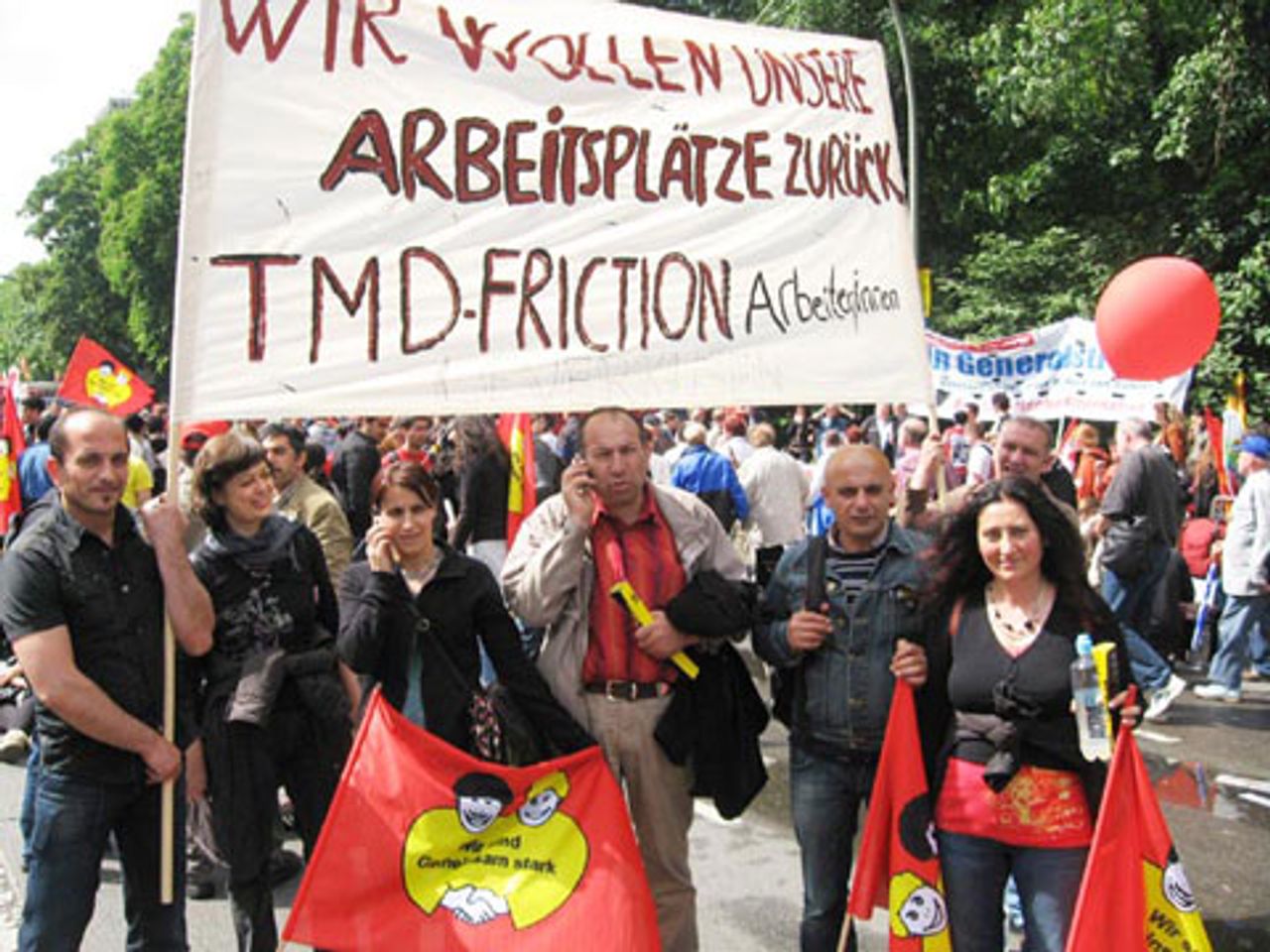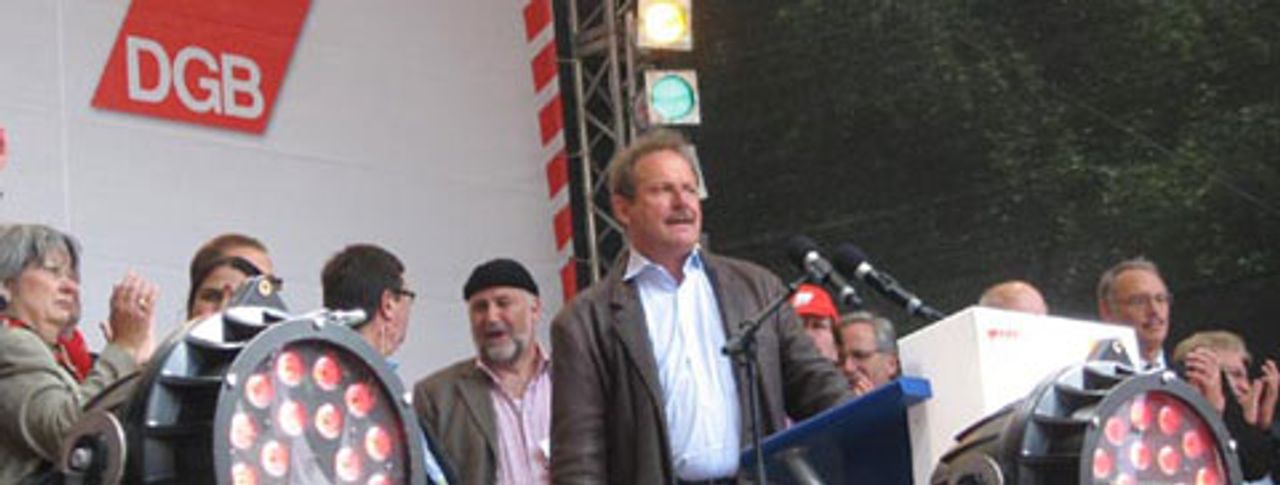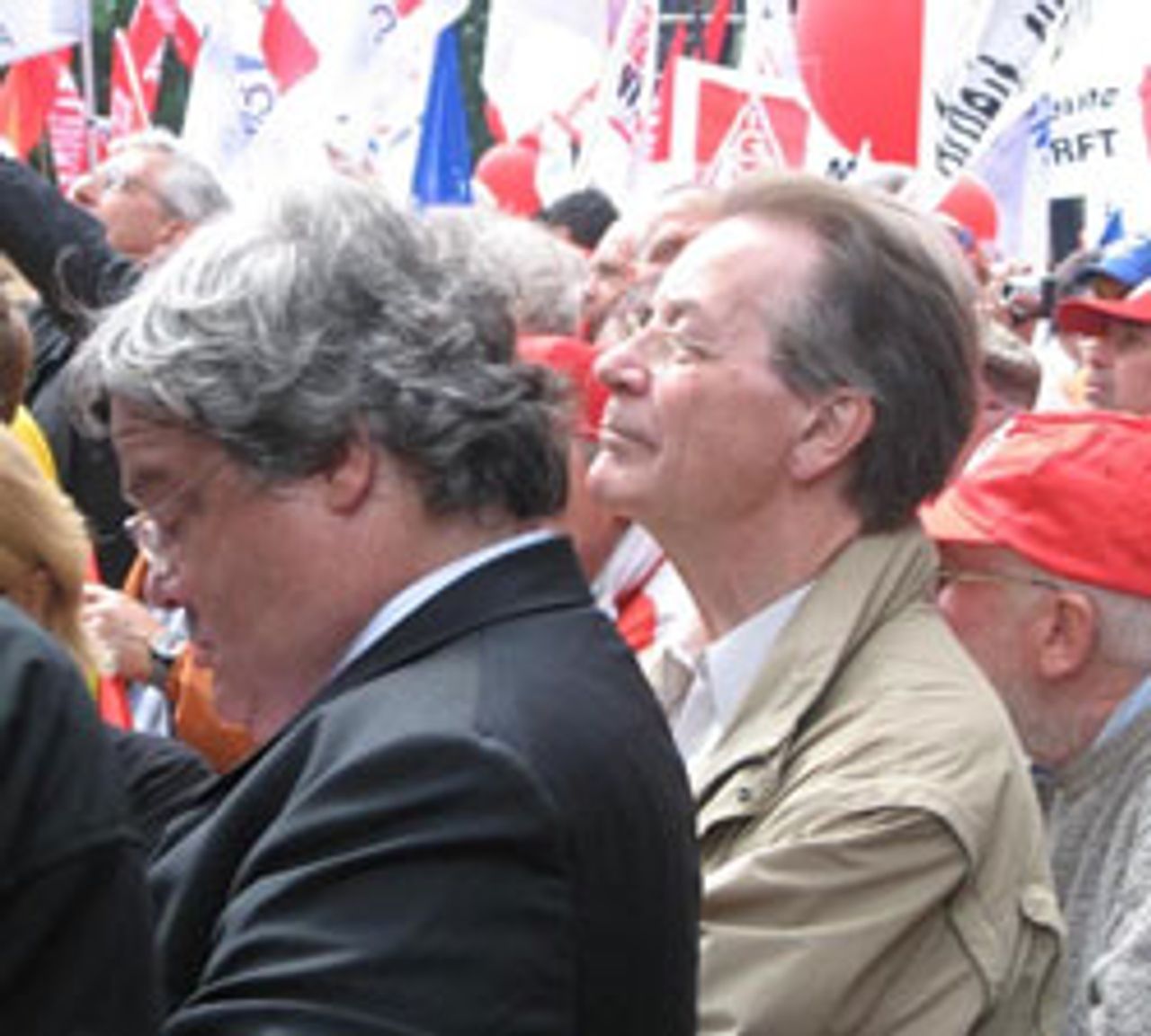Last weekend, the European Trade Union Confederation (ETUC) organised a series of demonstrations in a number of European capitals, including Berlin, Brussels, Madrid and Prague. Much smaller demonstrations were held in Birmingham, England (see “The Unite trade union ‘March for Jobs’”) and Bucharest, Romania.
 Sacked workers on the demonstration
Sacked workers on the demonstrationThe demonstrations drew an estimated turnout of 300,000. They were the culmination of the ETUC’s so-called “Days of Action,” which began last Thursday, May 14. The declared aim of the demonstrations was to appeal to the existing governments in Europe and the European Union to do more to protect workers against the consequences of the current international financial crisis.
In fact, the real purpose of the demonstrations and protests was to use the umbrella slogan of “Fight the crisis, for a social deal for Europe” to cover up the complete subordination of the trade union bureaucracies across Europe to company managements and their respective national governments.
In country after country, the unions have repeatedly intervened to demand that workers make concessions in order to retain some jobs in their own “national locations.”
Only this month, leading German trade unionists sought to prevent cross-border action by French workers at Continental Tires, which has factories in both countries. At the German Opel concern, leading members of the German trade union IG Metall have pleaded for a solution to the auto crisis and the bankruptcy of the mother concern General Motors which would leave at least some jobs at German plants—all at the expense of the Opel group’s other European operations in Britain, Belgium and Spain.
 Trade union leaders in Berlin
Trade union leaders in BerlinAt the same time, the German trade union regularly demonises the role of GM in the US in order to drive a wedge between European Opel workers and GM’s American workforce.
This is the nationalist poison that is being pumped into the veins of the European working class on a daily basis by the trade union bureaucracy—a fact that the participation of a small group of Opel workers at the demonstration in Brussels—the headquarters of the EU—could not cover up.
In seeking to cover their nationalist tracks, the union bureaucrats are quite prepared to utter denunciations of the financial markets. These criticisms should not be taken seriously.
In Brussels, Lothar Sorger, deputy chairman of the works council at the Opel factory in Kaiserslautern, Germany, told the press: “We believe that this unbridled market mechanism, this casino capitalism, has led us into the crisis, and we need stricter rules to ensure that this does not happen again.”
In Berlin, the head of the German Trade Union Federation, Michael Sommer, blustered against “voodoo capitalism” and “Anglo-American shareholder-value capitalism.” He denounced the activities of hedge funds and speculators, and even went so far as to declare that “the political and economic elites have failed.”
All of these remarks are just hollow demagogy. Waiting to greet Sommer following his descent from the stage in Berlin, and smiling their approval as Sommer spoke, were the chairman of the Social Democratic Party, Franz Müntefering, and the Green Party’s leading candidate for the upcoming European elections, Reinhard Bütikofer.
 Reinhard Bütikofer (left) Franz Müntefering (right)
Reinhard Bütikofer (left) Franz Müntefering (right)Both Müntefering and Bütikofer played leading roles in the former SPD-Green Party coalition government, which from 1998 to 2005 introduced the most devastating social cuts in the history of post-war Germany, while at the same time passing a series of laws opening the sluices for the sorts of cross-border junk bond financial speculation so roundly deplored by the trade union speakers from the platform in Berlin.
Just prior to his speech in Berlin, Sommer also repeated comments that he had made earlier this year, warning of the dangers of widespread civil unrest in Germany. “If we don’t act now, there will be consequences for democracy and social peace,” he told Deutsche Welle.
Sommer and the bureaucrats assembled on the stages in Berlin, Brussels, Madrid and Prague are desperately worried that growing civil unrest could threaten the continuation of European capitalism, and they offered their services to the political elite to help preserve and protect the existing system. This takes the form of support for precisely those political parties and political mechanisms that facilitated the current crisis.
Having made calls for the regulation of the financial markets—a demand repeated by virtually all of the trade union speakers—Sommer called for the implementation of the decisions made earlier this year by the G20 group of major capitalist nations. At the end of his speech Sommer meekly called for “European governments that do not bow down continually to the ideology of Anglo-American shareholder-value capitalism.”
Sommer’s appeal for cooperation with the existing political establishment was taken up by the next speaker at the rally in Berlin—the general secretary of the ETUC, John Monks.
Monks began with his own denunciations of “casino capitalism,” but rapidly proceeded to demonstrate his solidarity with the European Union and its political institutions. The European ruling class, he declared, was too “cautious, too nervous and lacked the necessary ambition and imagination to deal with the crisis.”
This gap, according to this pompous windbag, will be filled by the trade union bureaucracy. “The European Union is like the European trade union movement: when we take up a struggle jointly, then we are far more effective, powerful and impressive than when we act alone.” Monks’ declaration speaks volumes for the intense form of corporatist collaboration between the ETUC and the European Union.
Monks closed his remarks with a reference to political developments on the other side of the Atlantic and also sought to sow illusions in the current leadership of the US establishment. “In Europe we need leading figures like President Obama who see the trade unions as part of the solution!” he concluded.
In its own report on the international demonstrations, the official EU newspaper, EU Observer, concludes with an interesting remark. The web publication notes: “The ETUC-coordinated series of protests comes amid growing anger amongst European workers, but nonetheless is dwarfed by the general strikes and wave of ‘bossnappings’ that has hit France since the advent of the crisis, in which millions have taken to the streets.”
The EU Observer is quite correct to note that the protests on Saturday, dominated by flag waving and whistle blowing supporters of the unions, are dwarfed by the recent militant protests and demonstrations in France. In fact, the ETUC’s Days of Action were organised precisely to oppose such expressions of militancy and ensure the perseverance of “social peace.”
Sacked workers: “The trade unions have done absolutely nothing for us”
A group of workers who recently have been sacked from their posts at a West German auto parts company told the WSWS that they had been left in the lurch by the trade unions. A delegation of workers from the TMD Friction factory in Leverkusen travelled to Berlin to take part in the demonstration as part of their campaign to regain their jobs.
Sabit Okoyan reported that 160 workers at the factory had been sacked by management two months ago. The factory in Leverkusen produces parts for the auto industry—including leading brands such as Porsche and Mercedes, and has a total workforce of 800.
“I was a team leader at the factory and worked there for 13 years,” he said. “Then two months ago and with just two days notice I was sacked along with 160 colleagues. Many of those who have been sacked have also worked for the company for many years and have families and children. With our jobs gone we have little chance of finding any new work in the present economic climate.
“We were sacked with the argument that the company needed to rationalise, but I know for a fact that management had enough orders on the books and the factory is still operating a four-shift system round the clock. They just want to get rid of us because we earn over €2,000 per month and replace us with new younger workers at a much lower wage.”
When asked about the reaction of the trade union at the factory -the IG Chemie—Okayan and his colleagues were scathingly critical of the local bureaucrats.
He reported, “The trade unions have done absolutely nothing for us. We have tried to speak directly with management, but every time they send the local trade union representative who says that the union can do nothing about the dismissals and that we just have to wait for a social plan. The details of the social plan are also in the hands of the trade union and after two months we are still being kept in the dark about any details.
“We have organised three demonstrations in Leverkusen against our dismissals but have received no support from the unions. The trade unions operate merely as the extended arm of management.”
Subscribe to the IWA-RFC Newsletter
Get email updates on workers’ struggles and a global perspective from the International Workers Alliance of Rank-and-File Committees.
